Essential oils, aromatherapy, and potpourri in your home may be pleasant for you, but natural compounds in these fragrances can be dangerous for your cat. Take precautions when using these products so your cat does not have a toxic reaction. If your cat has any liver impairment, it may be best to eliminate these products from your cat's environment.
Essential Oil Toxicity to Cats
Certain essential oils were once considered to be safe for cats.
Warning
However, compelling evidence has now demonstrated that essential oils can be toxic to cats, whether taken internally, applied to the skin, or simply inhaled. Exposure can lead to serious liver damage, liver failure, seizures, or even death for cats.
Cats lack certain enzymes that provide the ability to properly metabolize the various compounds in essential oils, phenols in particular. These phenolic compounds occur naturally in some plants and are highly concentrated in essential oils. The liver is most often the organ which is affected by essential oils.
Essential Oils Potentially Toxic to Cats
These oils are known to contain phenols and be toxic to cats:
- Wintergreen oil
- Peppermint oil
- Citrus oil (including lemon oil)
- Tea tree oil (melaleuca oil)
- Pine oil
- Eucalyptus oil
- Cinnamon oil
- Pennyroyal oil
- Sweet birch oil
- Clove oil
- Ylang ylang oil
The higher the concentration of essential oil, the greater the risk to your cat. If your cat ingests any oils accidentally, go to the veterinarian immediately.
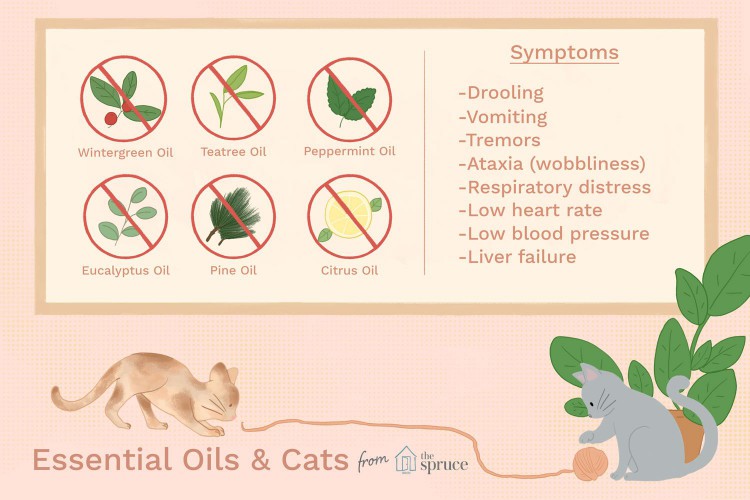
The Spruce Pets/Catherine Song
Symptoms of Essential Oil Poisoning
Cats absorb oils that are directly in contact with their skin. Oils diffused in the air are inhaled which can cause respiratory issues. They can also collect on the fur, which results in your cat ingesting them during licking and cleaning. Toxicity can occur very quickly or over a longer period of exposure.
If you notice any of these signs, move your cat immediately to fresh air, and contact your local veterinary emergency center right away. The veterinary center may have you call a poison hotline for additional guidance on treatment. The veterinarian may note a low heart rate, low blood pressure, and signs of liver failure.
How Your Cat May Be Exposed to Essential Oils
Your cat may be exposed to essential oils you use for your own purposes. Keep any essential oils in a cat-proof cabinet so your curious pet doesn't have access to them. Passive reed diffusers or potpourri pots can be knocked over, exposing your cat to the oil-containing liquid which can be ingested or absorbed on it's skin or fur with contact. Don't allow your pet to lick your skin if you have applied any products that contain essential oils.
Essential oil and aromatherapy diffusers, candles, liquid potpourri products, and room sprays are sources of airborne essential oils that cats can inhale which leads to respiratory irritation. If you can smell the fragrance of the oil, there is oil in the air and it can affect your cat.
Kittens, elderly cats, or cats who have liver or respiratory problems should be kept out of any room where essential oil diffusers are used. Don't wear aromatherapy jewelry when you are around your cat.
The Danger of Hydrosols
Hydrosols are often touted as a more natural, safer alternative to essential oils. Hydrosols are also known as "flower waters" as they consist of the water that remains after steam-distilling flowers or herbs in water, and are less saturated than essential oils.
While hydrosols are safer for use on human skin since they do not have to be diluted, they still are dangerous for cats and other pets. The water can hold on to residual matter from the plants that can be toxic if ingested or even inhaled.
Some pets can tolerate hydrosols, but others are more sensitive. Limit your pet's access to them and their scents to minimize the risk of any health issues.
Related Article

Why Do Cats Rub Against Your Legs?
Just what is your cat trying to tell you when it rubs up against your legs? While there can be diff
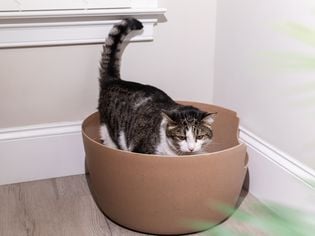
Why Cats Don't Always Cover Their Poop
Covering poop is a normal cat behavior, right? Not necessarily. Wild cats that bury their excremen
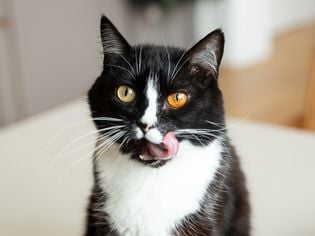
Which Tastes Can't Cats Experience?
Cats are known to have many keen senses. They have acute hearing, eyesight that is wired for motion
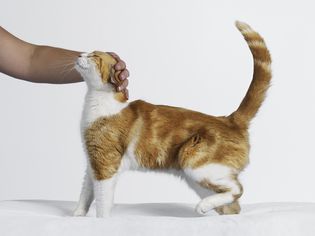
Can My Spayed Cat Still Be in Heat?
Female cats will undergo their first estrous, or heat cycle, when they become sexually mature. This
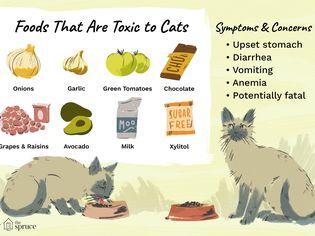
Human Foods That Are Poisonous to Cats
Some cats will beg and plead for human food, especially when they see you eating. But, can cats eat
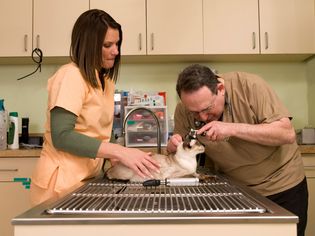
How to Prepare Your Cat for an Annual Veterinary Exam
Cats are not low-maintenance pets. They require the same loving care as dogs, pet birds, and exotic
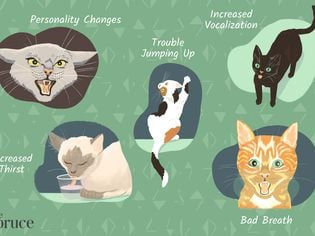
18 Warning Signs That Your Cat Is Crying for Help
It's important to recognize the warning signs that your cat is crying for help. Sometimes, it m
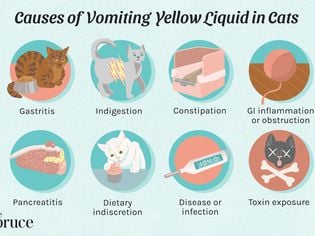
Why Is My Cat Throwing Up Yellow Liquid?
A cat throwing up yellow liquid may indicate several health concerns from indigestion to kidney dis
About FleaFree Feline
We are a premier digital platform committed to delivering high-quality content to our readers. Our mission is to provide accurate, reliable, and engaging information that adds value to our audience's daily lives.
Our team consists of experienced content creators and subject matter experts who uphold the highest standards of professionalism. In an era of information overload, we curate content with care, ensuring our users receive only the most relevant and trustworthy information.
Beyond just reporting facts, we focus on depth and context. Through expert analysis, comprehensive research, and clear presentation, we help our audience gain meaningful insights and make informed decisions.
We take pride in being a trusted information source for our growing community of readers. Our user-first approach means we continuously adapt to provide content that meets our audience's evolving needs and interests.
Innovation and excellence drive everything we do. We're committed to improving our platform and services to deliver the best possible experience for our users.

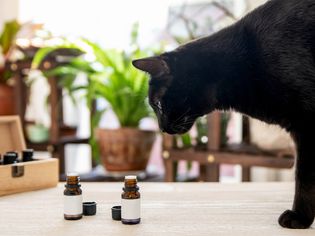
Comments on " Are Essential Oils Dangerous to Cats?" :